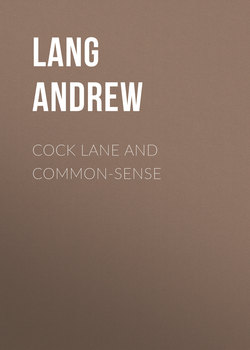Читать книгу Cock Lane and Common-Sense - Lang Andrew, May Kendall - Страница 6
COMPARATIVE PSYCHICAL RESEARCH
ОглавлениеA Party at Ragley Castle. The Miraculous Conformist. The Restoration and Scepticism. Experimental Proof of Spiritual Existence. Glanvill. Boyle. More. The Gentleman’s Butler. ‘Levitation.’ Witchcraft. Movements of Objects. The Drummer of Tedworth. Haunted Houses. Rerrick. Glenluce. Ghosts. ‘Spectral Evidence.’ Continuity and Uniformity of Stories. St. Joseph of Cupertino, his Flights. Modern Instances. Theory of Induced Hallucination. Ibn Batuta. Animated Furniture. From China to Peru. Rapping Spirit at Lyons. The Imposture at Orleans. The Stockwell Mystery. The Demon of Spraiton. Modern Instances. The Wesleys. Theory of Imposture. Conclusion.
In the month of February, 1665, there was assembled at Ragley Castle as curious a party as ever met in an English country-house. The hostess was the Lady Conway, a woman of remarkable talent and character, but wholly devoted to mystical speculations. In the end, unrestrained by the arguments of her clerical allies, she joined the Society of Friends, by the world called Quakers. Lady Conway at the time when her guests gathered at Ragley, as through all her later life, was suffering from violent chronic headache. The party at Ragley was invited to meet her latest medical attendant, an unlicensed practitioner, Mr. Valentine Greatrakes, or Greatorex; his name is spelled in a variety of ways. Mr. Greatrakes was called ‘The Irish Stroker’ and ‘The Miraculous Conformist’ by his admirers, for, while it was admitted that Dissenters might frequently possess, or might claim, powers of miracle, the gift, or the pretension, was rare among members of the Established Church. The person of Mr. Greatrakes, if we may believe Dr. Henry Stubbe, physician at Stratford-on-Avon, diffused a pleasing fragrance as of violets. Lord Herbert of Cherbury, it will be remembered, tells the same story about himself in his memoirs. Mr. Greatrakes ‘is a man of graceful personage and presence, and if my phantasy betrayed not my judgement,’ says Dr. Stubbe, ‘I observed in his eyes and meene a vivacitie and spritelinesse that is nothing common’.
